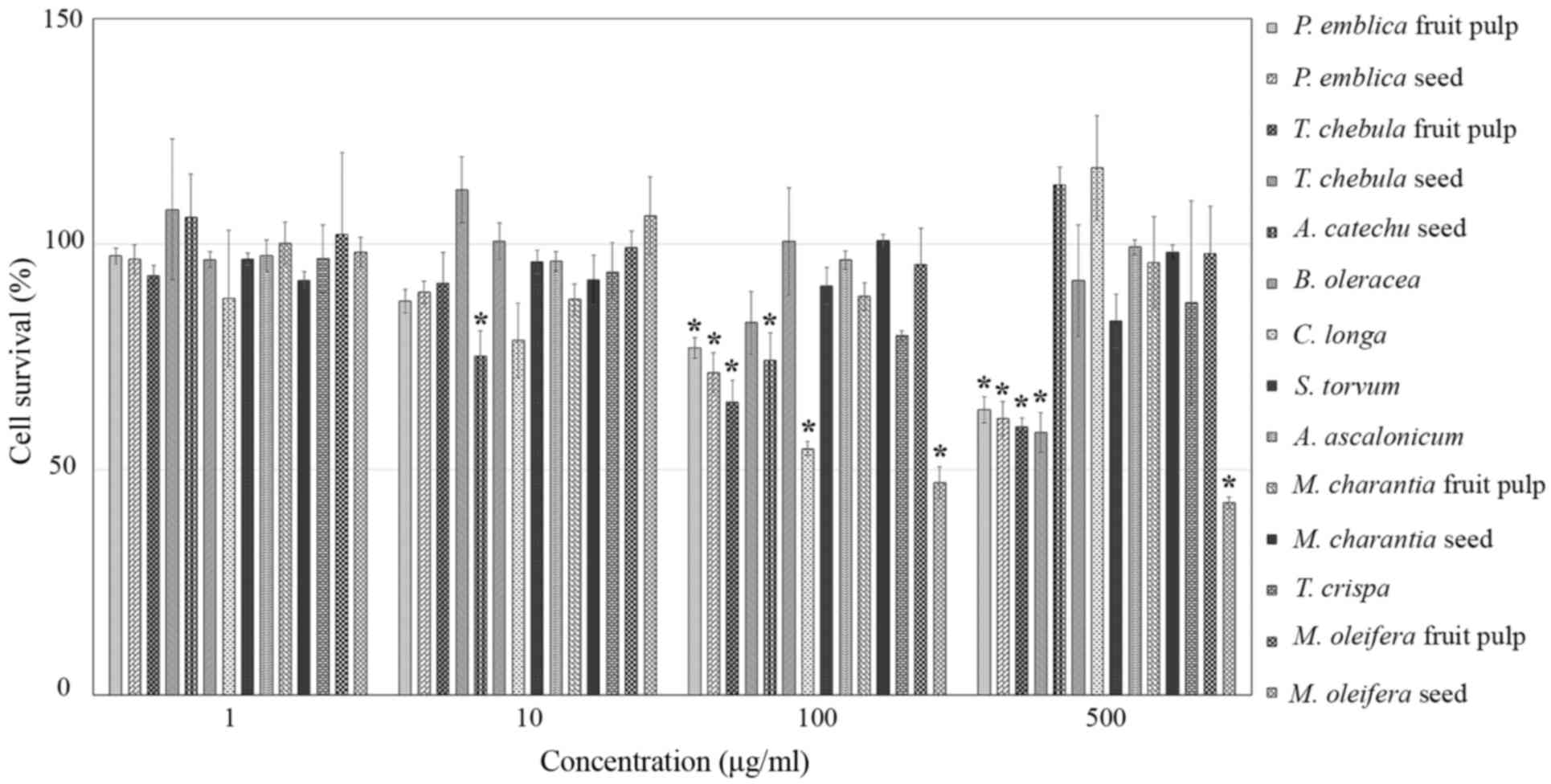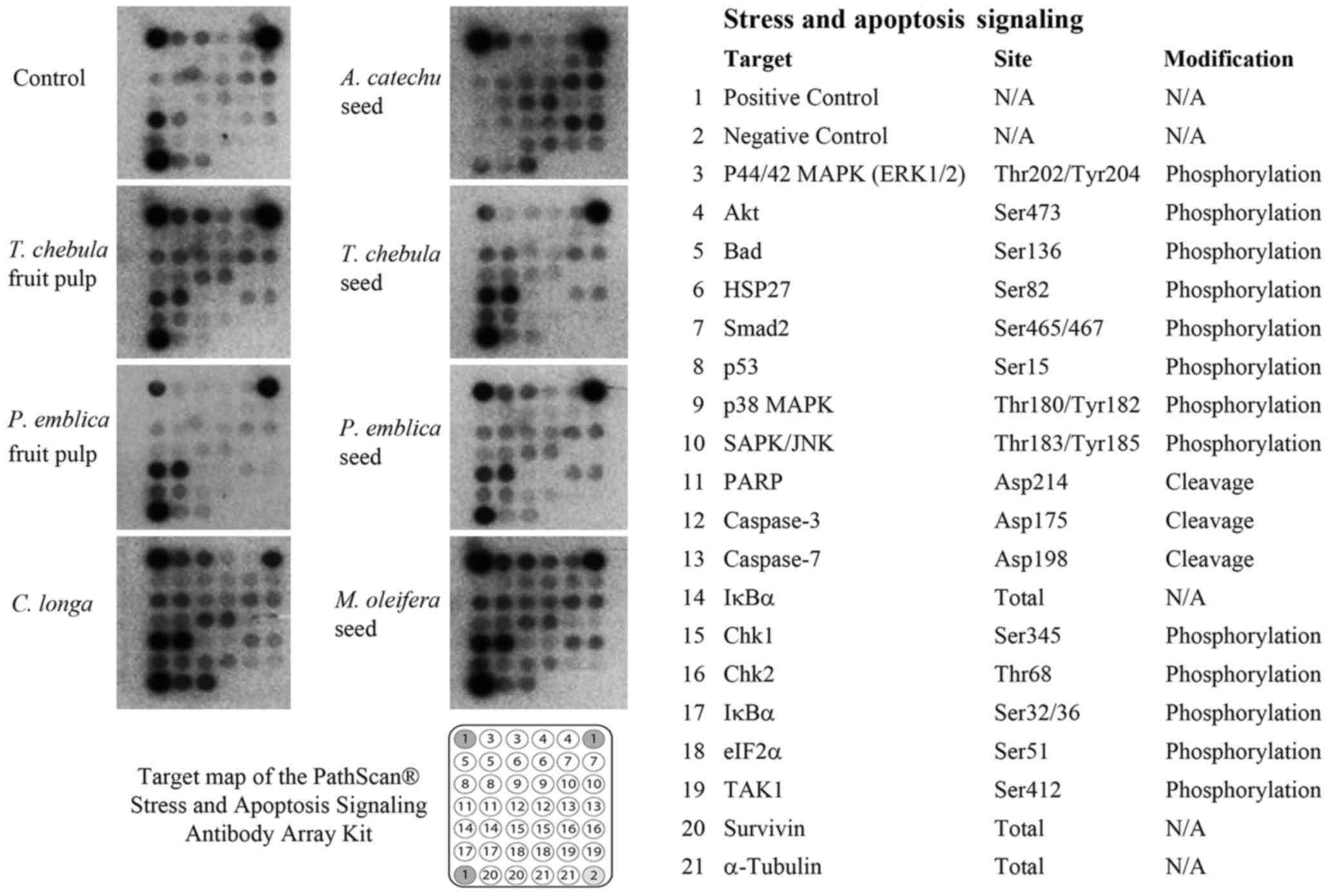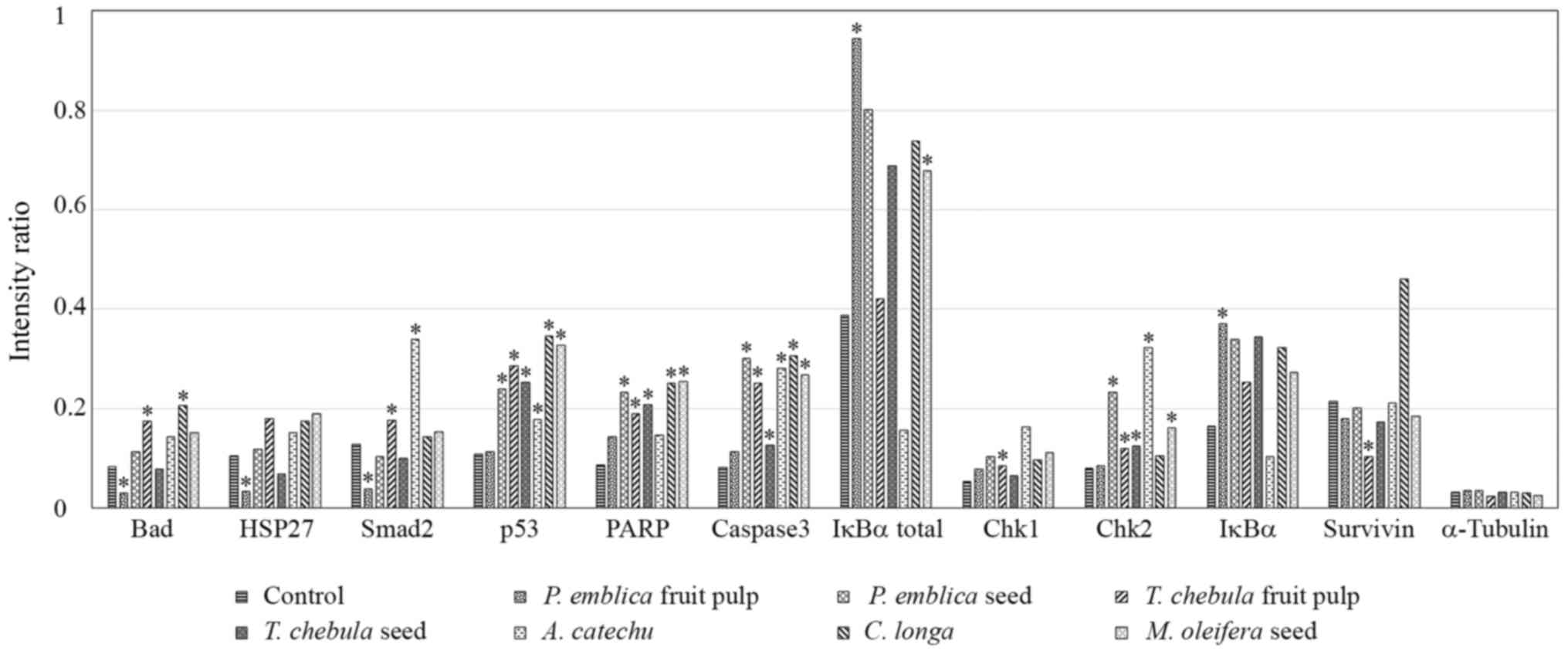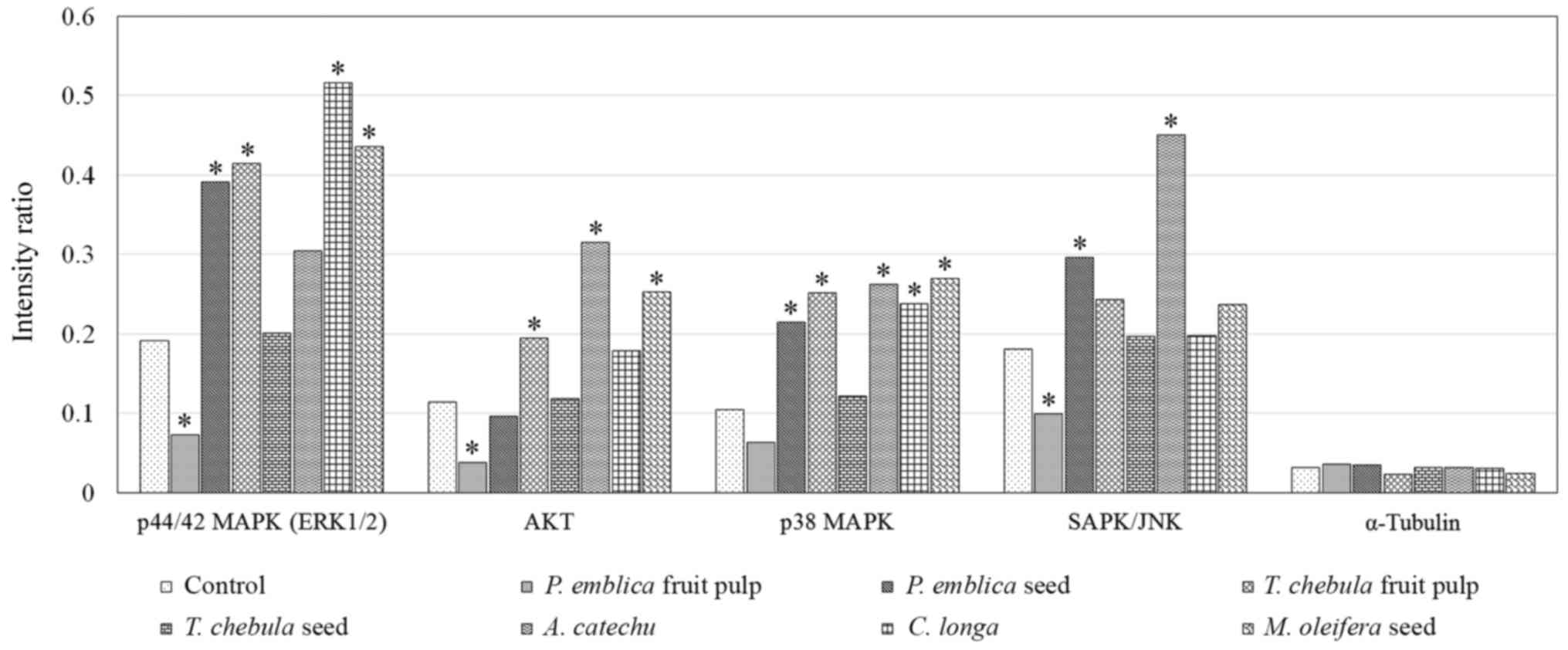|
1
|
Sripa B and Pairojkul C:
Cholangiocarcinoma: Lessons from Thailand. Curr Opin Gastroenterol.
24:349–356. 2008. View Article : Google Scholar : PubMed/NCBI
|
|
2
|
Shanmugam MK, Kannaiyan R and Sethi G:
Targeting cell signaling and apoptotic pathways by dietary agents:
Role in the prevention and treatment of cancer. Nutr Cancer.
63:161–173. 2011. View Article : Google Scholar : PubMed/NCBI
|
|
3
|
Zhao T, Sun Q, Marques M and Witcher M:
Anticancer properties of Phyllanthus emblica (Indian gooseberry).
Oxid Med Cell Longev. 2015:9508902015. View Article : Google Scholar : PubMed/NCBI
|
|
4
|
Mahata S, Pandey A, Shukla S, Tyagi A,
Husain SA, Das BC and Bharti AC: Anticancer activity of Phyllanthus
emblica Linn. (Indian gooseberry): Inhibition of transcription
factor AP-1 and HPV gene expression in cervical cancer cells. Nutr
Cancer. 65:(Suppl). S88–S97. 2013. View Article : Google Scholar
|
|
5
|
Zhu X, Wang J, Ou Y, Han W and Li H:
Polyphenol extract of Phyllanthus emblica (PEEP) induces inhibition
of cell proliferation and triggers apoptosis in cervical cancer
cells. Eur J Med Res. 18:462013. View Article : Google Scholar : PubMed/NCBI
|
|
6
|
Rahmani AH, Al Zohairy MA, Aly SM and Khan
MA: Curcumin: A potential candidate in prevention of cancer via
modulation of molecular pathways. BioMed Res Int. 2014:7616082014.
View Article : Google Scholar : PubMed/NCBI
|
|
7
|
Kumar N, Gangappa D, Gupta G and Karnati
R: Chebulagic acid from Terminalia chebula causes G1 arrest,
inhibits NFκB and induces apoptosis in retinoblastoma cells. BMC
Complement Altern Med. 14:3192014. View Article : Google Scholar : PubMed/NCBI
|
|
8
|
Leelawat S and Leelawat K: Moringa
oleifera extracts induce cholangiocarcinoma cell apoptosis by
induction of reactive oxygen species production. Int J Pharmacog
Phytochem Res. 6:183–189. 2014.
|
|
9
|
Berkovich L, Earon G, Ron I, Rimmon A,
Vexler A and Lev-Ari S: Moringa Oleifera aqueous leaf extract
down-regulates nuclear factor-kappaB and increases cytotoxic effect
of chemotherapy in pancreatic cancer cells. BMC Complement Altern
Med. 13:2122013. View Article : Google Scholar : PubMed/NCBI
|
|
10
|
Nhiem NX, Yen PH, Ngan NT, Quang TH, Kiem
PV, Minh CV, Tai BH, Cuong NX, Song SB and Kim YH: Inhibition of
nuclear transcription factor-κB and activation of peroxisome
proliferator-activated receptors in HepG2 cells by cucurbitane-type
triterpene glycosides from Momordica charantia. J Med Food.
15:369–377. 2012. View Article : Google Scholar : PubMed/NCBI
|
|
11
|
Li CJ, Tsang SF, Tsai CH, Tsai HY, Chyuan
JH and Hsu HY: Momordica charantia extract induces apoptosis in
human cancer cells through caspase- and mitochondria-dependent
pathways. Evid-Based Complement Altern Med. 2012:2619712012.
View Article : Google Scholar
|
|
12
|
Li M, Gao F, Zhou ZS, Zhang HM, Zhang R,
Wu YF, Bai MH, Li JJ, Lin SR and Peng JY: Arecoline inhibits
epithelial cell viability by upregulating the apoptosis pathway:
Implication for oral submucous fibrosis. Oncol Rep. 31:2422–2428.
2014.PubMed/NCBI
|
|
13
|
Devi JR and Thangam EB: Mechanisms of
anticancer activity of sulforaphane from Brassica oleracea in HEp-2
human epithelial carcinoma cell line. Asian Pac J Cancer Prev.
13:2095–2100. 2012. View Article : Google Scholar : PubMed/NCBI
|
|
14
|
Abu MN, Salleh MAM, Radzman NHM, Ismail
WIW, Yusoff RM and Hasan HF: Insulin sensitivity enhancement of the
mixture of Tinospora Crispa and Gelam (Melaleuca Cajuputi) honey
and its antiproliferative activity on hepatocellular carcinoma,
HepG2: A preliminary study. J Med Res Devel. 2:48–54. 2013.
|
|
15
|
Yousafa Z, Wanga Y and Baydounc E:
Phytochemistry and pharmacological studies on Solanum torvum
Swartz. J Appl Pharm Sci. 3:152–160. 2013.
|
|
16
|
Mohammadi-Motlagh HR, Mostafaie A and
Mansouri K: Anticancer and anti-inflammatory activities of shallot
(Allium ascalonicum) extract. Arch Med Sci. 7:38–44. 2011.
View Article : Google Scholar : PubMed/NCBI
|
|
17
|
Rattanasinganchan P, Leelawat K,
Treepongkaruna SA, Tocharoentanaphol C, Subwongcharoen S,
Suthiphongchai T and Tohtong R: Establishment and characterization
of a cholangiocarcinoma cell line (RMCCA-1) from a Thai patient.
World J Gastroenterol. 12:6500–6506. 2006. View Article : Google Scholar : PubMed/NCBI
|
|
18
|
Nowsheen S and Yang ES: The intersection
between DNA damage response and cell death pathways. Exp Oncol.
34:234–254. 2012.
|
|
19
|
Sasidharan S, Chen Y, Saravanan D, Sundram
KM and Yoga Latha L: Extraction, isolation and characterization of
bioactive compounds form plants' extracts. Afr J Tradit Complement
Altern Med. 8:1–10. 2011.PubMed/NCBI
|
|
20
|
Shalini S, Dorstyn L, Dawar S and Kumar S:
Old, new and emerging functions of caspases. Cell Death Differ.
22:526–539. 2015. View Article : Google Scholar : PubMed/NCBI
|
|
21
|
Yu SW, Wang H, Dawson TM and Dawson VL:
Poly(ADP-ribose) polymerase-1 and apoptosis inducing factor in
neurotoxicity. Neurobiol Dis. 14:303–317. 2003. View Article : Google Scholar : PubMed/NCBI
|
|
22
|
Smith J, Tho LM, Xu N and Gillespie DA:
The ATM-Chk2 and ATR-Chk1 pathways in DNA damage signaling and
cancer. Adv Cancer Res. 108:73–112. 2010. View Article : Google Scholar : PubMed/NCBI
|
|
23
|
Suh DK, Lee EJ, Kim HC and Kim JH:
Induction of G(1)/S phase arrest and apoptosis by quercetin in
human osteosarcoma cells. Arch Pharm Res. 33:781–785. 2010.
View Article : Google Scholar : PubMed/NCBI
|
|
24
|
Agarwal C, Tyagi A and Agarwal R: Gallic
acid causes inactivating phosphorylation of cdc25A/cdc25C-cdc2 via
ATM-Chk2 activation, leading to cell cycle arrest, and induces
apoptosis in human prostate carcinoma DU145 cells. Mol Cancer Ther.
5:3294–3302. 2006. View Article : Google Scholar : PubMed/NCBI
|
|
25
|
Meek DW: Regulation of the p53 response
and its relationship to cancer. Biochem J. 469:325–346. 2015.
View Article : Google Scholar : PubMed/NCBI
|
|
26
|
Dmitrieva NI, Michea LF, Rocha GM and Burg
MB: Cell cycle delay and apoptosis in response to osmotic stress.
Comp Biochem Physiol A Mol Integr Physiol. 130:411–420. 2001.
View Article : Google Scholar : PubMed/NCBI
|
|
27
|
Chi SW: Structural insights into the
transcription-independent apoptotic pathway of p53. BMB Rep.
47:167–172. 2014. View Article : Google Scholar : PubMed/NCBI
|
|
28
|
Wu J, Tang Q, Zhao S, Zheng F, Wu Y, Tang
G and Hahn SS: Extracellular signal-regulated kinase
signaling-mediated induction and interaction of FOXO3a and p53
contribute to the inhibition of nasopharyngeal carcinoma cell
growth by curcumin. Int J Oncol. 45:95–103. 2014.PubMed/NCBI
|
|
29
|
Sui X, Kong N, Ye L, Han W, Zhou J, Zhang
Q, He C and Pan H: p38 and JNK MAPK pathways control the balance of
apoptosis and autophagy in response to chemotherapeutic agents.
Cancer Lett. 344:174–179. 2014. View Article : Google Scholar : PubMed/NCBI
|
|
30
|
Leelawat K, Keeratichamroen S, Leelawat S
and Tohtong R: CD24 induces the invasion of cholangiocarcinoma
cells by upregulating CXCR4 and increasing the phosphorylation of
ERK1/2. Oncol Lett. 6:1439–1446. 2013.PubMed/NCBI
|
|
31
|
Kim SJ, Ju JW, Oh CD, Yoon YM, Song WK,
Kim JH, Yoo YJ, Bang OS, Kang SS and Chun JS: ERK-1/2 and p38
kinase oppositely regulate nitric oxide-induced apoptosis of
chondrocytes in association with p53, caspase-3, and
differentiation status. J Biol Chem. 277:1332–1339. 2002.
View Article : Google Scholar : PubMed/NCBI
|
|
32
|
Gong X, Liu A, Ming X, Deng P and Jiang Y:
UV-induced interaction between p38 MAPK and p53 serves as a
molecular switch in determining cell fate. FEBS Lett.
584:4711–4716. 2010. View Article : Google Scholar : PubMed/NCBI
|
|
33
|
Cao F, Liu T, Xu Y, Xu D and Feng S:
Curcumin inhibits cell proliferation and promotes apoptosis in
human osteoclastoma cell through MMP-9, NF-κB and JNK signaling
pathways. Int J Clin Exp Pathol. 8:6037–6045. 2015.PubMed/NCBI
|
|
34
|
Nishina H, Wada T and Katada T:
Physiological roles of SAPK/JNK signaling pathway. J Biochem.
136:123–126. 2004. View Article : Google Scholar : PubMed/NCBI
|
|
35
|
Davis WJ, Lehmann PZ and Li W: Nuclear
PI3K signaling in cell growth and tumorigenesis. Front Cell Dev
Biol. 3:242015. View Article : Google Scholar : PubMed/NCBI
|
|
36
|
Leelawat K, Udomchaiprasertkul W, Narong S
and Leelawat S: Induction of MKP-1 prevents the cytotoxic effects
of PI3K inhibition in hilar cholangiocarcinoma cells. J Cancer Res
Clin Oncol. 136:1537–1544. 2010. View Article : Google Scholar : PubMed/NCBI
|
|
37
|
Tang YQ, Jaganath I, Manikam R and Sekaran
SD: Phyllanthus suppresses prostate cancer cell, PC-3,
proliferation and induces apoptosis through multiple signaling
pathways (MAPKs, PI3K/Akt, NFκB, and hypoxia). Evid-Based
Complement Altern Med. 2013:1–13. 2013. View Article : Google Scholar
|


















